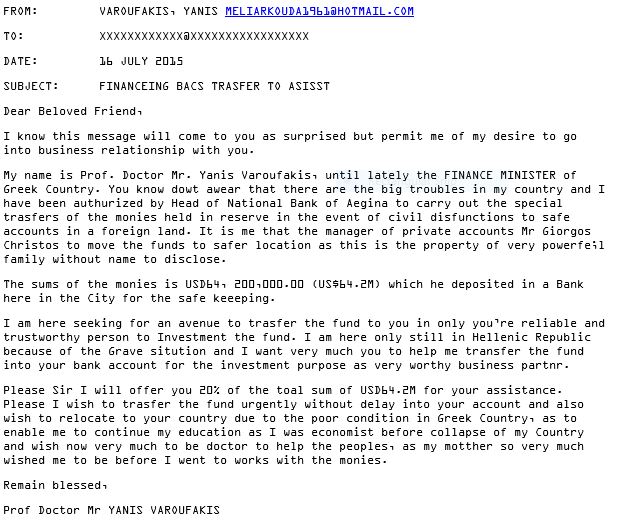
This week, Greek MPs had to wade through 977 pages of legislation in less than 48 hours, in order to vote on a mega-package that was a prerequisite for proceeding to the next stage of bailout negotiations with their European partners. It was delivered in the form of dead tree, 300 times over. One opposition MP estimated that this equated to 25 trees, 47 KWh of electricity and 324 tonnes of water. To illustrate his point further he held up a thumb drive and announced, “Someone should inform [House Speaker] Mrs Konstantopoulou that the 21st century gives us the convenience of being able to use USB sticks.”
Ouch. That was a deftly aimed shot. She may be the youngest ever House Speaker at 38, but Zoe Konstantopoulou has very strong opinions on how things should be done, and she takes a very grim view indeed of the USB stick (στικάκι, meaning “little stick”). Only last month, she thundered against the Governor of the Bank of Greece (already high on her hit list of “enemies of the people”) for daring to submit an annual report that (a) contained a factual account of the parlous state of public finances, and (b) was submitted not in person on the printed page but by courier on an evil “stikáki”. She intoned the word with particular disgust, as if she had just discovered a sex aid in a nun’s cell.
We don’t know if Mrs Konstantopoulou really is a luddite, but she certainly loves to play one. She knows her audience. You wouldn’t know it looking at the kids in Athens glued to their smartphones and addicted to Instagram, but as we have noted previously on this blog, at least 40% of Greeks have never used the internet, a very low rate for a developed country. To almost half the country’s population, technology is a bit of a mystery, and its use in government invokes a sense of suspicion and dread.
The word stikáki itself became common currency in sinister circumstances. It was on a stikáki that in 2010 Christine Lagarde, then French Finance Minister, handed the then Greek Finance Minister George Papakonstantinou a list of Greek account-holders in HSBC Bank in Geneva, part of a data leak that gifted European tax authorities with information on potential tax evaders. It was this stikáki containing the infamous “Lagarde list” (λίστα Λαγκάρντ) that Papakonstantinou is said to have tampered with to remove the names of family members, before passing it on to the tax authorities and the financial crime unit for investigation, an act for which he (singularly and slightly suspiciously if you ask me) received a conviction in court after he left office. The stikáki, then, was introduced into popular consciousness as an instrument of fraud, and a corruptible one at that. Media reports of the stikáki affair only helped to build up the mystique, describing the process of copying and editing as if it was a form of black magic, understood only by a dark priesthood, and illustrated with stock visuals of 1980s-era computers with archaic command-driven interfaces untainted by the introduction of the mouse. When Konstantopoulou rails against the stikáki, she is tapping into something deeper.
A hostile attitude to technology is dog-whistle for a brand of populist anti-elitism that sells well in the current environment. Earlier this week, former Prime Minister George Papandreou, in an interview in English to Fox Finance, used the example of his inability to make purchases on Amazon to illustrate some of the practical effects of capital controls to a US audience. In Greece he was instantly trolled, ironically on Twitter, for being the kind of out-of-touch elitist who worries about online retail therapy while pensioners have to queue at the bank for their daily cash rations. The symbolism was already in place and he walked right into it: even before he became a hate figure for being at the wheel when Greece first had to acknowledge its deficit and ask for a bailout, Papandreou was already tainted for speaking English more fluently than Greek, and engaging in such pretentious practices as working out (in lycra!) in a Parliament proudly riddled with grotesque obesity. His obsession with taking government online was yet another stick to beat him with.
Other examples of populist technophobia abound, and it is easy to see how for a generation not raised with tablets or even PCs, information technology has unpleasant connotations. When online tax reporting was made compulsory in 2011, some sectors of the public service were still paying employees “computer literacy” bonuses. As if the association between computers and the tax system isn’t deterrent enough, large numbers of taxpayers now rely on the services of tax accountants at a fixed fee of €20-50 to perform even even simple filings, because the user interface is so complex and unintuitive.
Internet-enabled transparency has also lagged. For example, there is no equivalent of the UK’s Hansard for publishing verbatim parliamentary debates, and the best that an interested researcher can do is trawl through hours of video footage in real time to locate particular statements or key words. A reformist Speaker supporting people power might have made this this a key priority; instead, funds have been devoted to mawkish propaganda videos advocating for German WWII wartime reparations, screened in the Athens Metro.
This is ironic. In the midst of the crisis, homegrown internet-enabled startups have been one of the few genuinely productive sectors that have achieved some success, encouraged by a combination of highly skilled returning graduates, low overheads, and relatively high grade infrastructure and connectivity. Ironic, because at the same time more conservative parents used their retirement bonuses to fund their kids in “safe” but unproductive ventures like souvlaki shops and bars (great for local consumers but not exactly scalable or exportable). And finally ironic because these same startups became some of the first casualties of the capital controls, when they were cut off from the connected world that they rely on for their business.
Zoe Konstantopoulou gives satirists an easy job, and it is too tempting to trash her when it has become such a popular sport among her very own political class. In demonising technology she is only giving her own caricaturish spin to a familiar trope. This is the real reason to be concerned.
Why would political leaders wish to stoke a climate of technophobia?
The obvious gain (for them) is that seeing technology as an insurmountable barrier deters people from asking the pertinent questions – and from sussing out the bogus ones, like this month’s referendum. You don’t have to subscribe to the Silicon Valley libertarian’s blind faith in the internet as a one-way street to democracy, enlightenment and prosperity, to agree that this is a bad thing. For bonus points, the canny populist can also make the technology business look like a bunch of irrelevant Marie Antoinettes or limp-wristed hipsters, rather than allow it to become a real economic alternative to honest public sector toil and heavily subsidised industrial farming.
Gotta go now. Just got called to perform an emergency stikáki exorcism.
Photo from koolnews.gr








